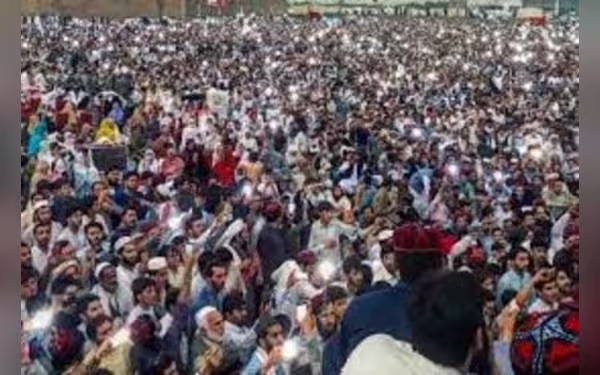Saturday, November 16, 2024 09:49 PM
PTM Jirga Unites Thousands for Pashtun Rights
- PTM Jirga attracts thousands in Khyber Pakhtunkhwa.
- Women, including APS victims' mothers, participate.
- Focus shifts to unity and future strategies.
 Image Credits: thefrontierpost
Image Credits: thefrontierpostPTM Jirga in Khyber Pakhtunkhwa unites thousands, emphasizing Pashtun rights and community solidarity amidst political challenges.
PESHAWAR: The Pashtun Tahafuz Movement (PTM) has once again made headlines with a massive gathering on October 11, 2024, in Khyber Pakhtunkhwa (KP) and the former tribal areas of Pakistan. This event, known as a Jirga, attracted thousands of participants, showcasing the movement's unwavering commitment to advocating for the rights of the Pashtun community. Despite facing recent restrictions imposed by the Pakistani government, the PTM's ability to mobilize such a large crowd speaks volumes about its resilience and the deep-rooted support it enjoys among the Pashtun people.
The Jirga served as a platform for unity among Pashtuns, drawing attendees from various regions of Pakistan and even Afghan nationals. Notably, the presence of women, including mothers of victims from the tragic Army Public School attack, added an emotional weight to the gathering. This inclusion highlights the movement's recognition of the diverse voices within the Pashtun community, emphasizing the importance of collective healing and solidarity.
Interestingly, the event marked a shift in the typical rhetoric associated with PTM gatherings. While anti-military slogans have often been a staple at such events, they were notably less frequent this time. Instead, the focus was on unity and future strategies, as articulated by PTM leader Manzoor Pashteen. However, the specific outcomes or decisions from the Jirga remain unclear, leaving many attendees eager for further developments.
The significance of this gathering extends beyond mere numbers; it symbolizes a growing sense of unity among Pashtuns in the face of political challenges. The absence of Afghan flags at the event also indicates a potential shift in focus towards local issues rather than cross-border affiliations. Logistical challenges, such as the closure of the Kohat Tunnel, posed difficulties for some attendees, yet the provincial government's support in providing tents and electricity helped accommodate the large crowd.
Despite these hurdles, the PTM successfully demonstrated its ability to mobilize a vast number of supporters, reinforcing its position as a major movement advocating for Pashtun rights and accountability. The event's promotion on social media, with contributions from both Pakistani and Afghan users, further illustrates the cross-border solidarity that remains a hallmark of PTM's outreach.
The recent PTM Jirga not only showcased the movement's strength but also highlighted the importance of unity among Pashtuns. As political landscapes continue to evolve, the PTM's ability to adapt and engage with its community will be crucial in shaping the future of Pashtun rights. The gathering serves as a reminder that, despite challenges, the spirit of solidarity and advocacy for justice remains alive and well among the Pashtun people.













